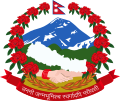Legislature Parliament of Nepal
| Legislature Parliament of Nepal | |
|---|---|
 |
|
| Type | |
| Type | |
| Leadership | |
|
Speaker
|
|
| Structure | |
| Seats | 601 |
 |
|
|
Political groups
|
Nepali Congress: 207 seats
Communist Party of Nepal (Maoist-Centre): 81 seats
Rastriya Prajatantra Party: 37 seats
Rastriya Janata Party Nepal: 24 seats
Nepal Loktantrik Forum: 18 seats
Federal Socialist Forum, Nepal: 15 seats
Nepal Majdoor Kisan Party: 4 seats
Rastriya Janamorcha: 3 seats
Communist Party of Nepal (United): 3 seats
Nepal Pariwar Dal: 2 seats
Others: 10 seats
Independent: 1 seat
Resigned: 10 seats
|
|
Length of term
|
Four years |
| Elections | |
| Mixed member majoritarian (First past the post for 240 members, proportional representation for 335 members, and 26 members appointed by the Prime Minister) | |
|
Last election
|
Nepalese Constituent Assembly election, 2013 |
|
Next election
|
November 2017 |
| Website | |
| http://www.can.gov.np/ | |
Legislature Parliament of Nepal (व्यवस्थापिका संसद) is the unicameral legislature of Nepal. It was formed as the result of the 2013 Constituent Assembly elections after the failure of the first Constituent Assembly to pass a new constitution.
Former Prime Minister Surya Bahadur Thapa, the oldest member of the house, assumed chairmanship of the CA on January 20, 2014 and administered the oath of office to 565 lawmakers at the first meeting of the assembly on January 21, 2014. Leaders of the NC, CPN-UML and UCPN (Maoist) pledged to draft a new constitution within a year. More than 80% of the members are new faces.
On January 26, 2014, President Ram Baran Yadav called for the election of a Prime Minister and the formation of a consensus government within a week as per article 38(1) of the constitution which provides for the formation of a government through political understanding. The Nepali Congress obtained the support of the CPN-UML for a NC-led consensus government and the two parties also agreed to hold local body elections within six months and adopt a new constitution within a year. An all-party meeting followed at which the CPN-UML, UCPN (Maoist) and MPRF-Loktantrik expressed support for a government under Sushil Koirala. The RRP-N boycotted the meeting. Further discussions were held between the NC, CPN-UML and UCPN (Maoist) at which the Maoists expressed support for the idea of a NC-led government but did not agree to join the government and decided to stay in opposition. On February 2, 2014, the NC abandoned its pursuit of a consensus government under article 38(1) of the constitution after the UCPN (Maoist) and RPP-N, the third and fourth largest parties, decided not to join the government. The party has initiated talks with the CPN-UML to form a majority government under article 38(2) of the constitution.
...
Wikipedia
